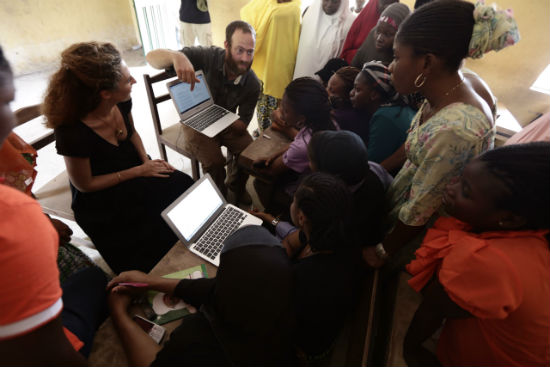First we must discard our preconceived ideas and listen. For any endeavor which aims to support economic and community development there really can be no more important first step. Yet so often, in an area of work with an unrelenting flow of new solutions to old problems, this fundamental attribute of showing up and listening is forgotten. More's the pity since, when you do listen, you gain the greatest insights, including how better to serve your husband!
Of course it's a failing we all have to one degree or the other, being unwilling to alter our carefully thought through plans once we've invested time and energy in trying to solve a problem. So many of us think we know best; all the more so when one is in a position where one can justifiably presume expertise. Take a recent trip of mine to the London Hospital for Tropical Diseases. When I requested anti-malarial medication for my 1-year-old daughter I was dressed down by a doctor and told, "There are some mothers who wouldn't risk their child's safety by taking them to Nigeria. She may be kidnapped or injured in a road accident." I then discovered he hadn't been there, but still deemed it reasonable to share his ill-informed opinion on a non-medical matter.
Of course this is an extreme example but, working on community-led development projects in developing countries, I make it a principle never to assume that my prior experience will automatically provide me with a perfect solution. Specifically, I help women and children create their own groups to give them an equal voice and opportunity in their community. To that end I have petitioned emirs (the leaders of their community) while lying flat on an ancient carpet in northern Nigeria, I have sat on the floor of rural huts talking to traditional healers who claim to cure HIV AIDS, I have met local and national politicians, parents, teachers, workers of all kinds and those who want a chance to work. On arrival, I am generally seen as another young bleeding heart aid worker who has come to build something, take photos, eat sandwiches and probably cry.
It takes a moment to explain that I haven't come to give them anything at all. I have come to have a conversation and, if I can, to help them work towards solutions of whatever they regard as their community's most pressing problems. Once people get over their surprise that I'm taking up their time without having anything tangible to give, and come to accept that I am there to listen, a far more constructive conversation generally unfolds. It has led to the design and implementation of some pretty unusual and wide-ranging programmes, from a house built of recycled plastic bottles, micro-enterprise in shea butter soap-making and, most recently, internet-enabled, solar-powered self-learning computer kiosks.
We call these kiosks Hello Hubs. On a recent build, meeting the women's group, I found myself explaining the power and possibility of the Internet. They had little or no concept of it. My colleague, Roland Wells, a man so warm-hearted and unthreatening that he was welcomed into the women's group, tried to sketch a chalk drawing of the Internet (try it -- it's harder than it sounds) to explain its potential to the group. We eventually abandoned Roland's stick people and satellite and tried another approach: "The Internet can help to answer your questions. It stores vast knowledge and information. Why not ask it a question?" A quiet conferring murmur ensued and eventually a self-appointed softly-spoken spokeswoman said, "We want to ask this Internet how to serve our husbands."
Of course I was disappointed, but it was not my place to direct their use of the web. So I tapped into my lap top, in front of 50 women who had never been online, "How to serve my husband." I did a quick mental calculation about the possibly embarrassing consequences of this Internet introduction, drastically underestimated the graphic nature of the results, and decided to move on quickly!
It wasn't a great start, but once we'd really established that it was their space, their Internet and their terminal, the questions started to flow, fast and demanding: Can I see Australia? Where is London? How can I stop my teenager from fighting? How do you give up smoking? Can I learn French? Can I make more money from my tailoring? On and on they asked. And Google, thankfully, steered the ship to a safer course, away from wifely servitude to the great wealth of information out there in the ether.
This is when my work is at its most exciting, when the journey is led by the community and not by my preconceptions. It also leads to the greatest opportunities to provide the most appropriate support, or it might mean swallowing disappointment and pride and accept that you might not be of any use at all. However, without this essential first step, any intervention of any kind is, in my view, doomed to fail.
